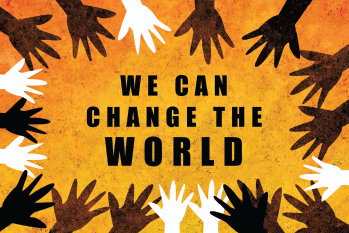
© Polsole / shutterstock.com
Events this past spring and summer, beginning with the death of George Floyd—a Black man killed during an arrest that sparked protests against police brutality—showed that many Americans want greater efforts to mitigate racism in the United States.
Explore This Issue
October 2020People from a broad spectrum of ethnicities and backgrounds responded to the call for action. Like many others, people in the medical industry, including those in otolaryngology, were inspired to act in a variety of ways.
The Impact of George Floyd’s Death
Brandon Esianor, MD, a resident physician in the department of otolaryngology–head and neck surgery at Vanderbilt University Medical Center in Nashville, for example, felt compelled to raise awareness of racial injustice within the Black community by organizing a Day of Silence with a few other residents. “We welcomed members of the Vanderbilt family, including residents, attendings, staff members, and patients and their families, to select specific time slots to kneel outside for 8 minutes and 46 seconds in honor of George Floyd’s life,” said Dr. Esianor. “During the demonstration, participants held up the names of individuals whose lives have been lost at the hands of police, and we passed out lists of different resources, such as movies, books, and websites, that people could use to learn more about racial injustice among the Black community and how they could serve as allies for those who are most affected.”
The event was a huge success, with more than 1,000 participants. It also helped spark the creation of a task force at Vanderbilt geared toward ensuring that momentum for change is maintained. Dr. Esianor, co-president of the Minority House Staff organization, is working with the task force to plan another event geared toward raising awareness of injustices within the Black community, including health disparities.
George Floyd’s untimely death also sparked a reaction from Noriko Yoshikawa, MD, a senior physician and assistant program director in the department of head and neck surgery at Kaiser Permanente in Oakland, Calif. “After his murder, residents and attendings had an educational session dedicated to racism in America,” she said. “Our medical center had even larger discussion circles in which Black colleagues shared their personal experiences of racism and reactions to current events. We’ve also started discussions on allyship, because there has been a lot of interest from those who previously haven’t dealt much with racism.” Furthermore, a plethora of hospital-wide grand rounds addressed racism in medicine, systemic racism, and the health effects of racism.
Following George Floyd’s death, Shannon D. Fayson, MD, a resident surgeon in the department of otolaryngology–head and neck surgery at the University of Michigan, Ann Arbor, says the university’s Diversity, Equity and Inclusion (DEI) Committee held an open-forum virtual meeting at which several people shared emotional personal accounts of racism. “We discussed how we could all contribute to creating an anti-racist culture in our department,” she said. “We received many positive messages from attendees who appreciated the authenticity and vulnerability shared during the meeting. Racism is a sensitive topic that many people choose not to discuss. However, I believe when people hear about racism’s painful effects from people they love and value, they can transiently feel their pain, and that experience makes them want to take a stance against injustice.”